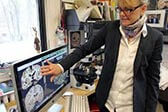Regenerative medicine is helpful for encephalopathy
Encephalopathy is a syndrome that affects the brain of the person and it functions abnormally. The abnormal functioning can be:

- Recurrent
- Transient
- Permanent
As far as the loss of brain function is concerned, it can be:
- Progressive
- Stable
- Static
Different aspect functioning of the brain (risk of encephalopathy)
The cells of the brain are connected with each other and neurons link them. Neurons are named dendrites and axons that have a cover called myelin sheath. Electrical impulses function with chemical receptors and thanks to them the brain of the person can translate impulses into actions or thoughts. Different parts of the brain are responsible for different functions. For instance, occipital lobes are in charge of vision, while Broca’s area is in charge of speech production and etc.
It is necessary for the person to have enough glucose, oxygen, vitamins and nutrients to function properly. What can cause the abnormal functioning of the brain?
- Problems of development in the uterus of mother;
- Anatomic structure abnormalities;
- Poisoning of brain when kidneys or liver does not function improperly, intoxication of the brain when alcohol or drugs are taken;
- Birth defect.
All these conditions can cause altered mental status because the memory is either confused or lost. The symptoms are different depending upon the part of the brain, which was affected. It can be numbness of certain part of the body or lack of coordination. When there is global involvement then the seizure follows. Generalized symptoms cause the lower level of consciousness and can bring to coma.
Abnormal thought processes can be characterized by hallucinations, poor memory, psychotic thinking, confusion.
The patient should apply to the doctor when he experiences inexplicable confusion and altered mental function. It is also necessary to call the emergency service when there is unexplained seizure and other conditions.
Possible ways of treatment encephalopathy
When the condition encephalopathy is suspected, the doctor studies history of the patient and asks specific questions to document patient's condition and previous diseases. The treatment programs of encephalopathy are individual depending upon the case. For instance, if the patient has short-term anoxia then oxygen therapy is appointed to him. Uremic poisoning can demand dialysis or kidney transplant therefore specific medical preparations and treatment courses can be appointed on the basis of underlying disease.
Among alternative treatment scenarios stem cell transplantation is considered to be the most efficient and can be safely applied when other means do not work. Stem cell injections are evaluated positively by professionals throughout the world. Fast relief that is offered to the patient after such course in UCTC improves the condition of the patient and his quality of life.